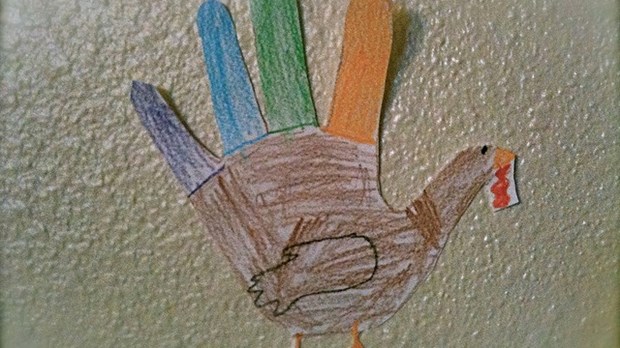
It strikes me as both odd and beautiful that America—this nation of fiercely independent citizens—slows down to give corporate thanks each year. Our other national holidays either come laden with controversy (consider the secular/sacred divide of Christmas and Easter, or the liberal/conservative skirmishes over Columbus Day), or these holidays stand as opportunities to take a day off from work without much thought given to the reason for the pause. Labor Day, Veteran’s Day, President’s Day, Martin Luther King Day—families do not make travel plans or roast turkeys to celebrate. But Thanksgiving cuts through religious and political divides, it brings families together and offers a time not only to celebrate but, more so, to give thanks.
My husband Peter recently pointed out to me that gratitude goes hand in hand with dependence. I was away from home on a Sunday morning, so he went to church with the kids on his own. He sat in the pews with our three children wriggling beside him (and for all I know, underneath him—Marilee has a way of lying down under the pew at some point in most services), and he was surprised to find himself feeling grateful. He could have felt angry, of course, at the kids and their inability to sit still. Even more likely, he could have felt resentful of me since I was off teaching adult Sunday School elsewhere with a childfree day ahead of me. But instead, he felt grateful as he realized how much his typical Sunday experience depended upon the help of the people around him.
Soon enough, Penny and Marilee both identified women in the pews nearby who welcomed them to their side. They spent the remaining hymns and prayers snuggled up next to these surrogate mothers in the congregation, and Peter’s gratitude only increased. Later, he wrote about this experience to the students at the school where he serves as Headmaster, and then he went on:
When we think about the first Thanksgiving celebrants we know that they were much more aware of their dependence—their creaturely dependence—than we are, separated as we are from the sources of the food, shelter, and energy we enjoy. Part of what gave rise to their celebration was very real gratitude for survival—for just being alive, and for the provision that came through the native peoples of New England and the land itself.
In 2014, it would be good for us to recapture some of this dependence and this gratitude. We are separated from the sources of our food production. We never have to wonder where the next meal will come from. We turn on the tap and clean water flows without end. We turn on lights and computers, and charge smart phones, without wonder or even curiosity. We take these truths for granted at our peril and much too easily. So my hope for myself this Thanksgiving is to cultivate a recognition of my dependence on the land, yes, and, even more, on the people and community around me.
In a country founded upon principles of independence, Thanksgiving offers us a moment to pause and recognize our interdependence upon one another and our dependence upon God, who gives us all good things. The abundance of food, the bonds with friends and family, even the possibility of a day of rest and feasting—all of these things come as gifts. This Thanksgiving, I am more aware than ever of how little I have done to deserve the blessings of my life. And as I recognize my tremendous need for others, and for the Lord, I can only respond with gratitude.
Support our work. Subscribe to CT and get one year free.
Recent Posts

This Odd American Holiday
This Odd American Holiday
This Odd American Holiday
This Odd American Holiday














